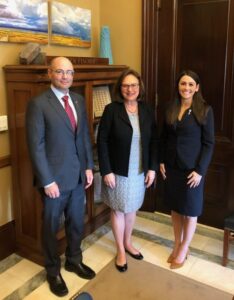Medical education and training, especially the first few years, can be grueling. For Kaitlyn Brittan, MD, who earned her medical degree in 2015 and finished a fellowship earlier this year at the University of Nebraska Medical Center, Omaha, advocacy has helped keep her passion for medicine alive and focused. She is now an assistant professor in the rheumatology division at the University of Nebraska Medical Center.
“In medical school, I was among all these amazing, motivated, intelligent people who went into medicine for the same reason I did: to make a difference. What we were mostly doing at that point, however, was studying,” she recalls. “I was really fortunate to get exposed to advocacy pretty early on, and I found it as an outlet and a way to become engaged and do something that would impact my colleagues, my future profession and my patients.”

Dr. Brittan
Dr. Brittan’s first foray into advocacy was on the state level, where she was “empowered to find my voice to give testimony to state legislators and help shape policies,” she says. “Thanks to a lot of mentorship, I was then able to find new opportunities and different platforms to share that voice more widely.”
Expanding Her Voice
As Dr. Brittan advanced into her internal medicine residency and began specializing in rheumatology, she honed her advocacy efforts, serving as the training member on the newly created Nebraska Rheumatology Society and targeting issues that specifically pertain to the rheumatology community. She also went through the ACR’s Advocacy 101 program designed to engage fellows-in-training and served as a fellow-in-training member on the ACR’s Government Affairs Committee.
She has been especially excited to participate in the ACR-sponsored Advocacy Leadership Conference and Advocates for Arthritis, which brings advocacy to Capitol Hill each year. “Advocates for Arthritis is one experience that has been particularly striking to me, because we actually have patients come with us to sit with elected officials and their staffers,” Dr. Brittan says. “Instead of just talking about abstract policies, our patients are right there explaining how those policies affect them on a day-to-day basis. When it’s personal like that, it carries a lot more weight, and you can see the light bulbs going off. It really is eye-opening.”

At the 2019 Advocacy Leadership Conference, Kent “Kwas” Huston, MD (left) and Kaitlyn Brittan, MD, (right) met with Sen. Deb Fischer (R-Neb.).
The spread of the coronavirus put an end to those face-to-face exchanges in 2020, but virtual meetings and the important work of advocacy power forward. “Despite the pandemic, we still are focusing on things like access to care, access to medicines and research funding for the field,” Dr. Brittan says. In fact, she believes the pandemic brought increased awareness to some topics, such as the impact of telehealth on the rural community, which is a large group in Nebraska. “Telehealth has been well-received and works well, so when it comes to access to care, we can provide real evidence during discussions with elected officials and their staffers that telehealth works and is appreciated by our patient population,” she says.
Being in the Room
For Dr. Brittan, the time and effort she has put into advocacy have paid back many times over. As a fellow-in-training, for instance, she noted invaluable opportunities for networking, leadership development and mentorship with leaders in the ACR.
“And on a deeper level, when I think about my day-to-day work and the frustrations arising from issues with prior authorizations, patient access to certain medications, or other things that interfere with patients getting the care they deserve, advocacy is the platform that tells me I don’t have to accept the status quo,” Dr. Brittan remarks. “Advocacy tells me I have a voice, I can be in the room where policy is made, and I actually have an ability to try to change the system to work better for all of us.”
At the same time, advocacy enhances her relationships with her patients. “When I tell them that I am personally trying to break down their barriers to care down by talking to elected officials, writing opinions and taking other steps to stand up for them and for their care, that builds their trust in my care of them and opens up our relationship,” she says.
“Advocacy is something that truly makes my job more enjoyable.”
Leslie Mertz, PhD, is a freelance science journalist based in northern Michigan.



